Nursing Programs & Professional Development
Explore our online nursing degrees & healthcare programs.
Dedicated to Your Success in Class and on the Job!
 American Sentinel College offers a number of accredited online nursing programs and healthcare management programs to help registered nurses and other busy healthcare professionals advance their prospects in their fields. We position students for success in class and throughout their careers by offering affordable nursing programs, academic resources and student support, and high-quality education in flexible online formats.
American Sentinel College offers a number of accredited online nursing programs and healthcare management programs to help registered nurses and other busy healthcare professionals advance their prospects in their fields. We position students for success in class and throughout their careers by offering affordable nursing programs, academic resources and student support, and high-quality education in flexible online formats.
Explore the many programs we offer to help you earn the skills you need to create and maintain your competitive edge:
Master’s Degree in Nursing and Healthcare Master’s Programs
Get Started on Your Degree!
Advance Your Career with Digital Credentials!
 Take your career to the next level, one micro-credential at a time. Using the Credly Acclaim platform, American Sentinel College gives registered nurses and other healthcare professionals the ability to quickly learn a skill and demonstrate mastery of that skill. Combined with a traditional university degree, these advanced micro-credential opportunities can be a powerful way to show others your passion for continually updating your knowledge and skills. Share your badge accomplishments directly to LinkedIn, Twitter, Facebook, by email, embedded in a digital resume, or as part of your email signature!
Take your career to the next level, one micro-credential at a time. Using the Credly Acclaim platform, American Sentinel College gives registered nurses and other healthcare professionals the ability to quickly learn a skill and demonstrate mastery of that skill. Combined with a traditional university degree, these advanced micro-credential opportunities can be a powerful way to show others your passion for continually updating your knowledge and skills. Share your badge accomplishments directly to LinkedIn, Twitter, Facebook, by email, embedded in a digital resume, or as part of your email signature!
To be eligible to take a single course or digital credential, the applicant must have a bachelor’s degree in a healthcare-related field (public health, nursing, dietetics, microbiology etc.) with a minimum GPA of 3.0 on a 4.0 scale, as shown on the applicant’s college transcript.
Build on your professional skills with digital credentials for:
Infection Prevention and Control (IPC)
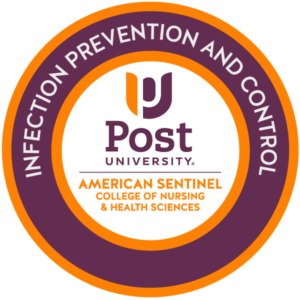 The IPC digital credential explores the roles and responsibilities of the infection prevention and control professional. Learn how to:
The IPC digital credential explores the roles and responsibilities of the infection prevention and control professional. Learn how to:
- Develop infection control strategies, policies and procedures
- Assess isolation/barrier precautions, appropriate patient placement and transition, patient care environments and hazards, environmental inspections, and patient immunization programs
- Examine infection control implications of products and medical equipment
- Create an organizational plan to address the influx of patients with communicable diseases and emerging infectious diseases
- Determine how public health agencies and communities collaborate in response to biological agents
- Examine infection prevention and control evidence-based approaches for antimicrobial stewardship
Upon completion of our 3-credit-hour Infection Prevention and Control course, you will receive a Digital Badge and Certificate of Completion.
Online Teaching in Nursing Education
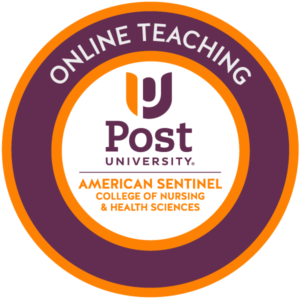 The Online Teaching in Nursing Education digital credential prepares the learner to be an effective online educator. Learn how to:
The Online Teaching in Nursing Education digital credential prepares the learner to be an effective online educator. Learn how to:
- Analyze unique characteristics and competencies of the online student within the context of a learner-focused environment
- Create activities to address specific learner needs in the online classroom
- Facilitate components of an online course
- Apply theory and best practices to the development and facilitation of an online course
Upon completion of our 3-credit-hour Distance Education course, you will receive a Digital Badge and Certificate of Completion.
Advanced Pharmacology
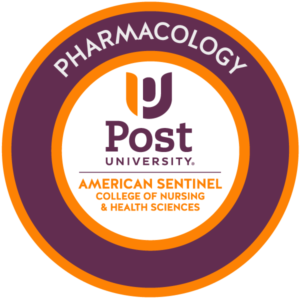 The Advanced Pharmacology digital credential focuses on the theoretical background and principles of the pharmacokinetics, pharmacodynamics, and pharmacotherapeutics of drugs and natural products commonly used in the advanced practice nurse’s management of acute and chronic illnesses. Learn how to:
The Advanced Pharmacology digital credential focuses on the theoretical background and principles of the pharmacokinetics, pharmacodynamics, and pharmacotherapeutics of drugs and natural products commonly used in the advanced practice nurse’s management of acute and chronic illnesses. Learn how to:
- Examine advanced pharmacokinetic and pharmacodynamics concepts as they relate to pathophysiologic changes in patients across the lifespan
- Identify the fundamental principles of pharmacology related to prescribed drugs, over the-counter drugs and natural products
- Discuss the mechanism of action of each major drug class and natural product at the molecular/cellular and organ/organ system level
- Evaluate common side effects and interactions associated with the major classes of drugs
- Utilize evidence-based advanced nursing and pharmacological interventions in select case studies to resolve complex and biological, psychological, physiological and pathophysiologic conditions
- Synthesize research and evidence of pharmacological concepts that guides clinical judgment to develop a therapeutic regimen that maximizes efficacy and maintains quality while minimizing adverse effects
- Differentiate between therapeutic and adverse effects of pharmacological interventions and inappropriate use patterns, such as polypharmacy and polysubstance abuse interactions
- Teach patients, family members, and others from diverse populations regarding safe and effective use of drugs and natural products
- Determine nursing prescriptive privileges, parameters and scope of practice, and restrictions as delineated in federal and state laws and regulations, including state nurse practice acts
Upon completion of our 3-credit-hour Advanced Pharmacology course, you will receive a Digital Badge and Certificate of Completion.
Advanced Pathophysiology
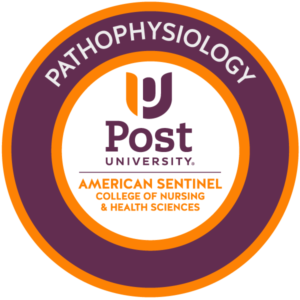 The Advanced Pathophysiology digital credential emphasizes concepts from the biological sciences and nursing science in an examination of pathophysiologic principles and common pathological conditions. Learn how to:
The Advanced Pathophysiology digital credential emphasizes concepts from the biological sciences and nursing science in an examination of pathophysiologic principles and common pathological conditions. Learn how to:
- Demonstrate knowledge of normal anatomy and physiology and pathological physiological mechanisms.
- Compare and contrast pathophysiological changes that occur across the lifespan.
- Explore the etiology, epidemiology, pathophysiology, and laboratory differences of disease process that impact health.
- Apply current evidence-based practice and treatment standards to pathological disease conditions.
- Evaluate data related to common disease processes and conditions to determine appropriate nursing interventions.
Upon completion of our 3-credit-hour Advanced Pathophysiology course, you will receive a Digital Badge and Certificate of Completion.
Expandable Content
Advanced Physical Assessment
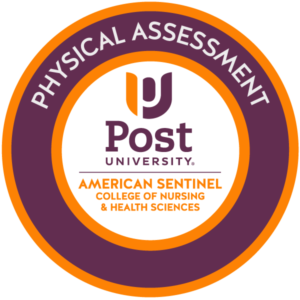 The Advanced Physical Assessment digital credential uses a comprehensive health promotion, disease prevention, and health restoration model to focus on the culturally competent, advanced comprehensive assessment of clients across the lifespan, including effective data collection and documentation. Learn how to:
The Advanced Physical Assessment digital credential uses a comprehensive health promotion, disease prevention, and health restoration model to focus on the culturally competent, advanced comprehensive assessment of clients across the lifespan, including effective data collection and documentation. Learn how to:
- Evaluate the role of the graduate level nurse to integrate knowledge of anatomy and pathophysiology when interpreting assessment and diagnostic data in individuals, families, and populations by performing comprehensive health assessment
- Synthesize the elements of a culturally sensitive, developmentally appropriate and comprehensive health history to implement comprehensive assessment methods that focus on a holistic view of the patient
- Perform a systematic advanced physical assessment on patients across the life span to differentiate between normal and abnormal findings and formulate sound diagnostic reasoning and clinical judgment
- Apply the process of collecting and analyzing patient data and correlating it with evidence-based data for clinical reasoning
- Assess the bio-psychosocial, cultural, spiritual, and environmental elements that may affect health
- Develop nursing care approaches through the process of comprehensive health assessment which promote health, reduce health risks, empower preventive health behaviors, and restore health
- Effectively utilize health informatics technologies to retrieve data, improve decision making, and evaluate evidence to prevent or treat illness, perform patient education, and formulate an adaptive needs list in advanced health assessment with diverse clients and population
Upon completion of our 3-credit-hour Advanced Physical Assessment course, you will receive a Digital Badge and Certificate of Completion.
Diagnostic Reasoning for the APRN
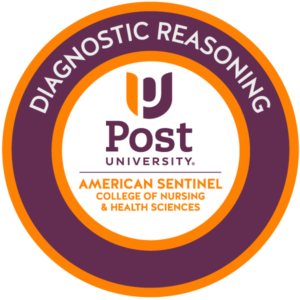 The Diagnostic Reasoning for the APRN digital credential introduces the nurse practitioner student to diagnostic reasoning. Previous pathophysiology, pharmacology and physical assessment knowledge is applied to simulated cases. Learn how to:
The Diagnostic Reasoning for the APRN digital credential introduces the nurse practitioner student to diagnostic reasoning. Previous pathophysiology, pharmacology and physical assessment knowledge is applied to simulated cases. Learn how to:
- Define diagnostic reasoning and discuss the cause of diagnostic error
- Generate hypotheses and create evidence-based testing strategies
- Uncover basic abnormalities in laboratory, radiologic, and cardiologic studies and associate with appropriate differential diagnoses
- Synthesize evidence to support interventions
- Utilize informatics to access resources for clinical practice
- Discuss opportunities to improve care for populations across the lifespan
Upon completion of our 3-credit-hour Diagnostic Reasoning course, you will receive a Digital Badge and Certificate of Completion.
Healthcare Financial Management
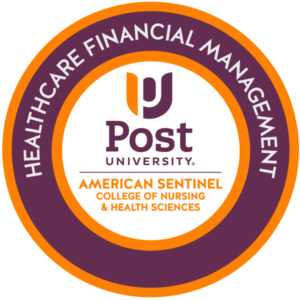 The Healthcare Financial Management digital credential explores the most used tools, processes, and techniques employed by financial managers in a healthcare environment. Learn how to:
The Healthcare Financial Management digital credential explores the most used tools, processes, and techniques employed by financial managers in a healthcare environment. Learn how to:
- Relate the purpose of healthcare financial management to the purpose of the organization and the value of healthcare financial management to management functions
- Apply quality assessment to healthcare financial management, identify the key financial managers, and examine healthcare reform
- Explain major components of financial statements, principles in preparing good financial reports, and tax-exempt status
- Describe and examine methods of RVU, classifying cost, allocating cost, and assembling cost
- Analyze distinctions among HMO’s, PPO’s, Defined-Contribution Plans, Direct Contracting, Consumer-Driven Plans, and High-Deductible Plans
- Understand the history and cost methods of Medicare and Medicaid
- Identify and explain the importance of working capital, revenue cycle, strategic/operational planning, and budgeting
Upon completion of our 3-credit-hour Healthcare Financial Management course, you will receive a Digital Badge and Certificate of Completion.
Case Management Concepts
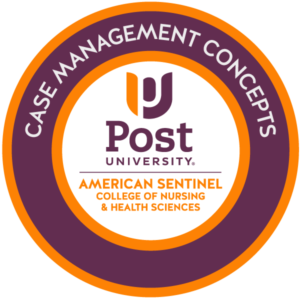 The Case Management Concepts digital credential examines the history and evolution of the case manager concept from inception of the idea through current practice. Learn how to:
The Case Management Concepts digital credential examines the history and evolution of the case manager concept from inception of the idea through current practice. Learn how to:
- Explore the roles of the nurse case manager in the contemporary health care structure and in collaboration with the interdisciplinary team
- Analyze the concepts of case management, health care insurance, Affordable Care Act, and other economic, political, cultural, legal, and ethical issues in case management
- Apply the concept of leadership in the utilization of the case management process from the perspective of an advance practice nurse
- Demonstrate knowledge of information technology and health care information systems in case management
- Apply insurance criteria to evaluate patient eligibility for services, for quality improvement and for safety in practice
- Initiate a patient centered case management plan using national standard of practice and evidence-based practice guidelines
Upon completion of our 3-credit-hour Concepts of Case Management course, you will receive a Digital Badge and Certificate of Completion.
Case Management Process
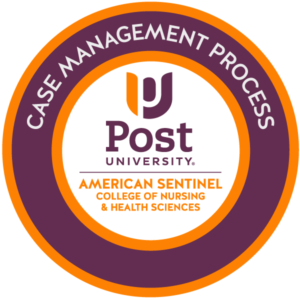 The Case Management Process digital credential examines the case management and reimbursement process as it relates to various specialty areas of healthcare across the life span. Learn how to:
The Case Management Process digital credential examines the case management and reimbursement process as it relates to various specialty areas of healthcare across the life span. Learn how to:
- Evaluate the role of the advanced nurse case manager in reimbursement for patient care including the concepts of healthcare insurance and healthcare benefits as well as the various reimbursement systems
- Examine the case management process throughout the healthcare continuum
- Assess the discharge planning process as it relates to care management and levels of care
- Correlate the process of case management with positive and culturally sensitive patient outcomes
- Delineate the role of the advanced practice nurse in the case management process relating to quality improvement, leadership skills, interdisciplinary collaboration, and communication
Upon completion of our 3-credit-hour Process of Case Management course, you will receive a Digital Badge and Certificate of Completion.
Case Management Practice
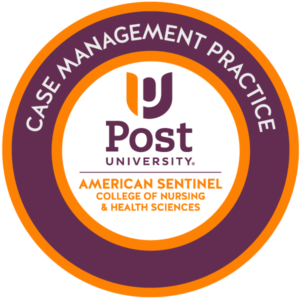 The Case Management Practice digital credential examines the role of the case manager as patient advocate and the incorporation of evidence-based care. Learn how to:
The Case Management Practice digital credential examines the role of the case manager as patient advocate and the incorporation of evidence-based care. Learn how to:
- Examine the role of the case manager in a selected specialty-based practice/target population
- Apply current evidence-based nursing case management practices to an identified target population
- Assess the implications of electronic information systems upon the role of the nurse case manager
- Examine the legal issues related to nursing case management
Upon completion of our 3-credit-hour Case Management and Evidence Based Practice course, you will receive a Digital Badge and Certificate of Completion.
Life Care Planning
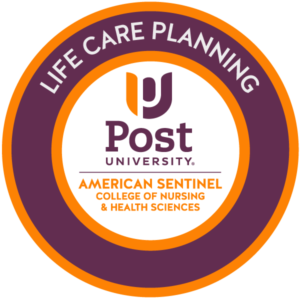 The Life Care Planning digital credential examines the financial and ethical aspects of life care planning as it relates to disease management, coordination of care, and the process of identifying long-term care for vulnerable populations. Learn how to:
The Life Care Planning digital credential examines the financial and ethical aspects of life care planning as it relates to disease management, coordination of care, and the process of identifying long-term care for vulnerable populations. Learn how to:
- Assess the role of the nurse case manager in a specific specialty practice related to the life-care planning process
- Examine the individual needs and characteristics of an identified population in relation to the nurse case manager
- Investigate ethical, and financial issues related to life care planning
- Apply case management plans, critical pathways, evidence-based practice, and protocols in life care planning
- Develop a short term and long-term life care plan for a specific patient
- Coordinate case management protocols within an interdisciplinary care environment for an identified target population
Upon completion of our 3-credit-hour Life Care Planning course, you will receive a Digital Badge and Certificate of Completion.
FAQs
Pursuing an advanced nursing degree online is a big step. You probably have some questions. We have answers.
Are online nursing degrees respected?
Nursing degrees that are obtained in an online education format are generally accepted in the healthcare industry. Online nursing programs must meet the same rigorous educational standards as traditional, on-campus programs. These programs may be recognized by accrediting bodies. It is essential for students to ensure their chosen online nursing program is accredited and reputable.
Why is the accreditation of nursing education programs important?
Accreditation of nursing education programs is crucial for several reasons. First, it ensures that the program meets established standards of quality and excellence, helping to maintain the integrity of nursing education. Second, it provides a level of assurance to students, employers, and the public that graduates of accredited programs are well-prepared and competent. Third, accreditation encourages ongoing improvement and innovation within nursing education, as programs strive to meet and exceed accreditation standards. Overall, accreditation promotes consistency, accountability, and the delivery of high-quality nursing education, ultimately benefiting the healthcare system and the patients who rely on well-trained nurses for their care.
Who accredits nursing programs?
In the United States, nursing programs are accredited by two main accrediting bodies: the Accreditation Commission for Education in Nursing (ACEN) and the Commission on Collegiate Nursing Education (CCNE). ACEN accredits all types and levels of nursing education programs, while CCNE focuses on accrediting baccalaureate and higher-degree nursing programs. These accrediting agencies evaluate nursing programs to ensure they meet established standards of quality, curriculum, faculty qualifications, and student outcomes.
Are online nursing programs accredited?
Many online nursing programs are accredited. American Sentinel College at Post University offers several accredited online nursing programs. The Registered Nurse to Bachelor of Science in Nursing, Registered Nurse to Master of Science in Nursing, and Master of Science in Nursing programs are accredited by the Commission on Collegiate Nursing Education (CCNE). The Doctor of Nursing Practice has been accredited by the Accreditation Commission for Education in Nursing (ACEN). Prospective nursing students should always verify the accreditation status of any nursing program before enrolling to ensure it meets the necessary educational standards and prepares graduates for licensure and successful nursing careers.
What are advanced nursing degrees?
Advanced nursing degrees refer to post-licensure programs designed to further the education and skills of registered nurses (RNs), enabling them to specialize in specific areas of healthcare. Advanced nursing degrees at the master’s and doctoral levels typically require registered nurses to have completed a Bachelor of Science in Nursing (BSN) before enrolling.
What are the different types of advanced nursing degrees?
Advanced nursing degrees encompass several distinct programs that cater to different career paths and educational goals. American Sentinel College offers the Master of Science in Nursing (MSN), which provides advanced training in nursing in eight different specializations, such as nurse practitioner, nursing education, or nursing leadership. Additionally, we offer the Doctor of Nursing Practice (DNP), which focuses on advanced clinical practice in four leadership specializations, including nurse education, informatics, professional leadership, and organizational leadership.
Why do nurses need advanced degrees?
Nurses could pursue advanced nursing degrees for several reasons. Firstly, advanced degrees may allow nurses to specialize in specific areas of healthcare, such as becoming nurse practitioners or nurse educators. Additionally, these degrees may help nurses build advanced clinical skills and expertise, enabling them to provide more comprehensive and specialized patient care. Advanced nursing degrees also open doors to leadership positions in healthcare, as DNP-prepared nurses could pursue roles in healthcare administration, policy development, nursing education, and healthcare system improvement.
Can I take advanced nursing courses online?
Yes, you can often take advanced nursing courses online. American Sentinel College offers an online Master of Science in Nursing (MSN) and Doctor of Nursing Practice (DNP). These online courses provide flexibility for working nurses and allow them to balance their education with their professional responsibilities.